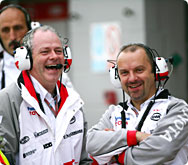| If the Car's not Fast, it doesn't Mean Anything
Later you achieved success at Jordan and Renault before joining Panasonic Toyota Racing in 2003. What is the secret to your ongoing success?
The foundation of my work and the real secrets to success were learned during my time at Tyrrell, where with limited resources we had to be careful to prioritise what we spent our money on. Harvey Postlethwaite used to have a saying that “any idiot can design a racing car, the trick is to design a quick one”. That phrase has remained a guiding principle for me to this day. Harvey was good at prioritising what made the car quick. The lessons I learned at Tyrrell have been applicable wherever
I have gone since, including Toyota. It is based on the philosophy of investing resources, however big or small, in the right areas, and the trick in being a Technical Director is the ability to do this. The key to chassis performance lies in aerodynamics and that is what I have worked hard on at Toyota; implementing a proven methodology in the windtunnel and prioritising what is important.
It appears to be complex to balance chassis, engine and aerodynamics in one F1 car. What would you consider to be the key to producing a top class F1 car?
I think it is possible to balance the different elements. When you look at the cars winning races and leading the championships, these teams know how to get the balance right – that is why they are where they are. Engine performance is critical and the integration of the engine within the chassis is important. That is one of the benefits that Toyota has with its under-one-roof philosophy by having the engine and chassis departments in close working proximity to each other.
 |
 |
| In another role, Mike Gascoyne directs the team during races. To the left is Richard Cregan, team manager. |
|
Everything we do is for our Ultimate Goal
Who were you mentors coming up through Formula 1?
Engineering-wise, there were two guys who acted as inspiration for me. Firstly Harvey Postlethwaite. His untimely death of a heart attack in Barcelona was a great loss to F1 and engineering. Also, Bob Bell who first employed me at McLaren. I am pleased to see him having the success he deserves at Renault, but hopefully all of us at Toyota will try to put a stop to that soon!
What drives you to success and how do you assess the meaning in “winning” and “success”?
Simply, what drives me is to be involved in a competitive sport. We all want our cars to be the best and to beat the best. When the cars are at the front end of the field it is a fantastic feeling, but above all it is a team sport and it is more special to be part of that team. Now we have reached a point at Toyota where success will be winning the World Championship. Getting podiums like we did in Malaysia, Bahrain and Spain is a form of success, and our first victories will be a kind of success,
but essentially these results are only a stepping stone to the ultimate challenge of winning the championship.
What does Panasonic Toyota Racing still have to do to win its first race?
The whole team has performed exceptionally well this season and we can be satisfied with our results, but we still need to make the car quicker. That means using our core ideology of continuous improvement in all areas, having a better engine, better aerodynamics, more downforce, less drag and making better use of the tyres through these improvements.
|